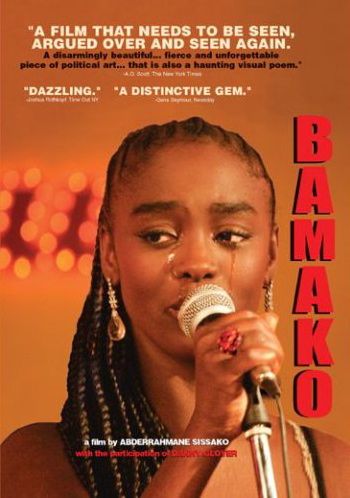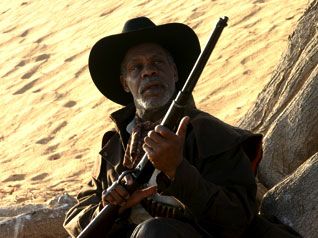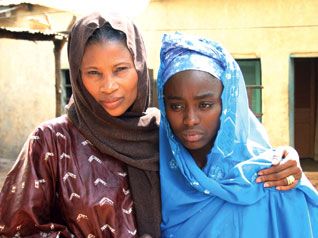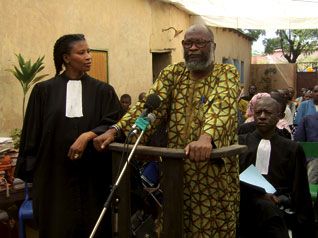| Release List | Reviews | Price Search | Shop | Newsletter | Forum | DVD Giveaways | Blu-Ray/ HD DVD | Advertise |
| Reviews & Columns |
|
Reviews DVD TV on DVD Blu-ray International DVDs Theatrical Reviews by Studio Video Games Features Collector Series DVDs Easter Egg Database Interviews DVD Talk TV DVD Talk Radio Feature Articles Columns Anime Talk DVD Savant HD Talk Horror DVDs Silent DVD
|
DVD Talk Forum |
|
|
| Resources |
|
DVD Price Search Customer Service #'s RCE Info Links |
|
Columns
|
 |
Bamako |

|
Bamako New Yorker 2006 / Color / 1:78 anamorphic widescreen / 117 min. / Street Date April 15, 2008 / 29.95 Starring: Aïssa Maïga, Tiécoura Traoré, Hélène Diarra, Balla Habib Dembélé, Djénéba Koné, Hamadoun Kassogué, William Bourdon, Mamadou Kanouté, Gabriel Magma Konaté, Aminata Traoré, Danny Glover Cinematography Jacques Besse Production Design Mahamadou Kouyaté Film Editor Nadia Ben Rachid Produced by Denis Freyd, Abderrahmane Sissako Written and Directed by Abderrahmane Sissako |
With the new century's global economics putting renewed pressure on the Third World, indigenous filmmaking is becoming less anthropological in nature, and more political. Excellent dramas like Harayuma and Faraw! show the hardship and societal discord brought about by entrenched poverty, but 2006's Bamako breaks with ordinary narrative to directly accuse the The World Bank (The International Monetary Fund) of bleeding dry the African country of Mali.
Writer-director Abderrahmane Sissako's film is an odd mix that uses music and a fantasy sequence to avoid being one long economics debate. The film is bookended by musical sequences where the main character Melé (Aïssa Maïga) sings in a nightclub in Bamako, the capital of Mali. At one point, the film breaks form to present a brief fantasy spoof of a Spaghetti Western, starring Danny Glover. Some bad men ride into Bamako, shoot up a street and kill a woman. The bandits are both white and black, French and African. They shoot the town's second teacher, because "We only need one teacher." The film-within-a-film even has its own title sequence.

But the main action all takes place at a fantasy trial, held in Melé's dusty courtyard. The trial and the household share the same space: we see Melé waking up and walking in a robe to get her washing water, and her unemployed husband Chaka (Tiécoura Traoré) laces up her dress while the judge and attorneys take their places. The fancy words and solemn ceremonies share space with a Malian family in trouble. Chaka and Melé may be breaking up, and a relative inside their house is near death from some untreated malady. A policeman assigned to the court restricts access to the gallery, that consists of several rows of folding chairs set up in Melé's yard. People draw water from a well, yet converse on cell phones.
Several storylines play out around the periphery. Melé wanders proudly in and out to go to work; she wears pretty dresses. The men sit idly and are often interviewed by the police chief. One of the gate guards is replaced for falling asleep and allowing his gun to be stolen. The police chief acts suspicious of Chaka, just to see if he reacts in a guilty way. The trial is interrupted while a marriage procession passes through. Some of the trial procedure allows for a traditional Malian practice involving ceremonial tribal testimony. Elderly spokesmen simply speak what's on their mind; one grizzled gentleman must be gently nudged to wait until he's asked to contribute. Later on, another old fellow sings his testimony. It's not even translated, as his wail is the subject, not his words. Another 'speaker' is a laid-off teacher. He walks to the podium, but says nothing and is asked to step down.

All of this is basically a support structure to allow Bamako to concentrate on long trial scenes. At issue is responsiblity for the depressed economy in Mali, and the likelihood that it will default on the IMF's loans. There is no real clash of ideas because author Sissako controls both sides of the argument. The judges remain coldly neutral while the World Bank lawyer accuses Mali of once again failing to hold up its end of the loan agreement. Liberal French lawyer Roland Rappaport plays the World Bank lawyer, and in an insert essay he discusses how difficult it was to argue a position he doesn't favor. Arguing for Mali are several real lawyers, led by Aïssata Tall Sall, a firebrand advocate for her country.
The World Bank lays out the European side of the issue: Mali accepted the terms of the Bank's loans with the knowledge that they'd once and for all have to take responsibility for their own development. Rappaport accuses the Malians of allowing corruption and trying to weasel out of legally binding agreements.
Aïssata Tall Sall takes the podium several times to characterize the World Bank's actions as a fraud. Most of the loan money was pre-earmarked to pay interest on already accrued debt, leaving little or no funds available for basic social services. As loans began to default, the corporations holding the paperwork used their bargaining power to gain added concessions, taking control, or outright ownership of state-owned utilities and infrastructure. The privatized railroads now stop only at towns that serve the corporate interests, so the mini-industry that served the train passengers has disappeared.
Under the old colonial system the ruling country at least took on a minimal responsibiity for its dependent populations. The new policies allow multinational companies to privatize Mali's resources, infrastructure and even its water supply. As these are simple business deals, the effect on the country's population is not an issue. The citizens of Mali have been pushed aside. Privatized social services operate on a cash and carry basis, so schools shut down, teachers and civil servants are dismissed, and most of the people have no access to medicine. If you get sick and need medical care, you die. In other words, the World Bank's policies treat Mali as a business concern. The human population is considered an expendable resource.

The local lawyers argue that the companies have been taking Mali's mineral and agricultural wealth for almost nothing for so long, that any realistic appraisal would conclude that the so-called debt has been repaid many times over. They counter World Bank president Wolfowitz's complaints about corruption by charging collusion between the World Bank and the multinational corporations. The 'new Third World economy' is simply a more efficient way for the rich to loot the poor. With the people dispossessed and hospitals and schools gone, the new order has ruined any hope for the future. It's cultural and national extermination, in slow motion.
Bamako is an illustrated advocacy docu, but not a harangue. It hopes to counter in its small way the media myths that irresponsible Africans soak up generous western aid and continue in their backward ways. They never say that the aid almost always comes in the form of discounted weaponry. African politicians not completely in the pocket of the World Bank are considered leftists; if they demonstrate or actively oppose Western policies, they're branded as terrorists.
New Yorker's disc of Bamako is a beautiful enhanced transfer with a sharp image and glowing colors. The audio track is clear and bright and removable English subtitles. The languages spoken on-screen are French and Bambara. The film's emotional, catchy song is Naam by Christy Azuma & Uppers International.
Director Abderrahmane Sissako takes lead position in a number of interviews. Sissako talks about his background as a film student and his commitment to the politics of his country. Actor and executive producer Danny Glover details his involvement in the project. The most inspiring of the other spokespeople is Gita Sen, a vibrant woman with great communication skills and non-confrontational political talking points. Harry Belafonte appears in some less-than-optimal footage speaking about Africa's political problems. An informative insert booklet contains essays by Aminata Taoré and Mahmood Mamdani as well as individual statements by the lawyers-turned-actors Aïssata Tall Sall, William Bourdon and Roland Rappaport. Critical accolades, graphics and a sampling of the impressive soundtrack song can be heard at the Official Bamako Movie Site.
On a scale of Excellent, Good, Fair, and Poor,
Bamako rates:
Movie: Very Good ++
Video: Excellent
Sound: Excellent
Supplements: Interviews with Abderrahmane Sissako, Danny Glover, Yao Graham, Gita Sen; Harry Belafonte speaks on a NY Film Festival panel. Essays by Aminata Taoré and Mahmood Mamdani
Packaging: Keep case
Reviewed: April 20, 2008
Reviews on the Savant main site have additional credits information and are more likely to be updated and annotated with reader input and graphics.
Review Staff | About DVD Talk | Newsletter Subscribe | Join DVD Talk Forum
Copyright © MH Sub I, LLC dba Internet Brands. | Privacy Policy | Terms of Use
Subscribe to DVDTalk's Newsletters
|
| Release List | Reviews | Price Search | Shop | SUBSCRIBE | Forum | DVD Giveaways | Blu-Ray/ HD DVD | Advertise |





